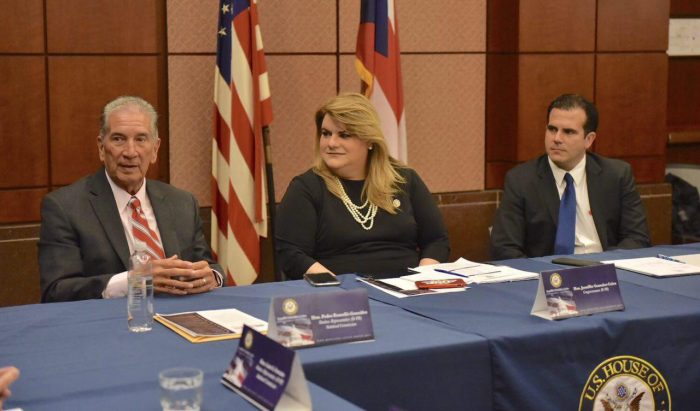Originally published at Latino USA.


From left to right: Former governor of Puerto Rico Pedro Rosselló, resident commissioner Jenniffer González and current governor of Puerto Rico Ricardo Rosselló (Pedro’s Rosselló’s son) at a January 9, 2017 meeting in Washington, D.C. with the island’s statehood commission. (Photo provided by the government of Puerto Rico)
A Tuesday media release from the government of Puerto Rico said that the island’s resident commissioner —a non-voting delegate of Congress— plans to present the seven members of a Puerto Rican statehood commission to the House of Representatives.
Describing the statehood commission as “Puerto Rico’s congressional delegation,” the release explained that resident commissioner Jenniffer González will go to Congress on Wednesday with the following members of the statehood commission: former governor Pedro Rosselló (father of current governor Ricardo Rosselló); former governor Carlos Romero Barceló; former governor Luis Fortuño; Charlie Rodríguez, president of Puerto Rico’s Democratic Party; Zoraida Fonalledas, national committeewoman of the Republican Party; baseball Hall of Famer Iván Rodríguez; and attorney Alfonso Aguilar, a former Bush administration official who has replaced retired major general Felix Santoni on the commission.
“We definitely want to be much more aggressive. It is time to try to change the dynamic,” Aguilar told the New York Times. Besides working in the Bush White House, Aguilar was also a former executive director of the Puerto Rico Federal Affairs Administration and press secretary to Pedro Rosselló.
revived push for statehood was announced by Ricardo Rosselló on December 27, when he met with the commission and said the following, on the 97th day after Hurricane María devastated the island: “We are going to demand the solution to the problems that affect the quality of life of our people, through the admission of Puerto Rico as the 51st state of the nation. That is our commitment.”
In a Tuesday interview with the New York Times, Ricardo Rosselló reiterated his December 27 comments.
“What we want to impress upon Congress and, quite frankly, the whole nation is that Puerto Ricans want a change from their second-class status that Puerto Ricans have experienced and has been exposed in the path of Hurricane Maria,” he said.
The Statehood Question Before Hurricane María
Days before a non-binding June 11, 2017 plebiscite led to an overwhelming and controversial victory for Puerto Rico’s statehood proponents, Puerto Rican lawmakers passed a Tennessee Plan (modeled after Tennessee’s 18th-century efforts to become a state) that called for an equality commission of seven Puerto Ricans, who would then travel to Washington, D.C. and ask for two seats in the Senate and five seats in the House of Representatives.
As a territory of the United States, the estimated 3.4 million Puerto Ricans living on the island lack voting representation in Congress. They also cannot vote for President in national elections, even though they are American citizens.
Although a handful of elected representatives have supported statehood for Puerto Rico, Congress has yet to formally act since last June’s vote, and it is not likely that it will in the near future—especially since the island is recovering from Hurricane María.
Last year, statehood for Puerto Rico earned the support of Democratic National Committee chair Tom Pérez. In addition, a White House spokesperson said last June that Congress was the ultimate arbiter of determining Puerto Rico’s territorial relationship with the United Sates.
This just in: @WhiteHouse spokesperson on #Plebiscito2017 #PuertoRico pic.twitter.com/pI1EDk8NaU
— Julio Ricardo Varela (@julito77) June 12, 2017
***
Julio (Julito) Ricardo Varela is the founder of Latino Rebels, co-host of In The Thick and a frequent contributor to Latino USA. He tweets from @julito77.



[…] It would have been certain and real. Instead, it is just another colonial illusion, just like the Shadow Congress—the creation of a governor who is no longer in […]
[…] on Wednesday, Puerto Rico’s statehood commission held a press conference in Washington, D.C., the same day it “demanded to be seated in the […]